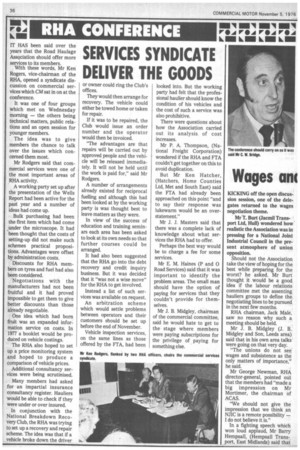SERVICES SYNDICATE DELIVER THE GOODS
Page 38

If you've noticed an error in this article please click here to report it so we can fix it.
IT HAS been said over the years that the Road Haulage Association should offer more services to its members.
With these words, Mr Ken Rogers, vice-chairman of the RHA, opened a syndicate discussion on commercial services which CM sat in on at the conference.
It was one of four groups which met on Wednesday morning — the others being technical matters, public relations and an open session for younger members.
The idea was to give members the chance to talk over the issues which concerned them most.
Mr Rodgers said that commercial services were one of the most important areas of RHA activity.
A working party set up after the presentation of the Wells Report had been active for the past year and a number of ideas had come up.
Bulk purchasing had been the first item which had come _under the microscope. It had been thought that the costs of setting-up did not make such schemes practical propositions. Advantages were offset by administration costs.
Discounts for RHA members on tyres and fuel had also been considered.
Negotiations with the manufacturers had not been fruitful and it had proved impossible to get them to give better discounts than those already negotiable.
One idea which had born fruit was an expanded information service on costs. In 1977 a booklet would be produced on vehicle costings.
The RHA also hoped to set up a price monitoring system and hoped to produce a comparison of vehicle prices.
Additional consultancy services were being scrutinised.
Many members had asked for an impartial insurance consultancy register. Hauliers would be able to check if they were under or over insured.
In conjunction with the National Breakdown Recovery Club, the RHA was trying to set up a recovery and repair scheme. The idea was that if a vehicle broke down the driver or owner could ring the Club's offices.
They would then arrange for recovery. The vehicle could either be towed home or taken for repair.
If it was to be repaired, the Club would issue an order number and the operator would then be invoiced.
"The advantages are that repairs will be carried out by approved people and the vehicle will be released immediately. It will not be held until the work is paid for," said Mr Rodgers.
A number of arrangements already existed for reciprocal fuelling and although this had been looked at by the working party is was thought best to leave matters as they were.
In view of the success of education and training seminars each area has been asked to look at its own needs so that further courses could be arranged.
It had also been suggested that the RHA go into the debt recovery and credit inquiry business. But it was decided that it "was not a wise move" for the RHA to get involved.
Instead a list of such services was available on request.
An arbitration scheme which would settle problems between operators and their customers should be set up before the end of November.
Vehicle inspection services, on the same lines as those offered by the FTA, had been looked into. But the working party had felt that the professional haulier should know the condition of his vehicles and the cost of such a service was also prohibitive.
There were questions about how the Association carried out its analysis_ of cost increases.
Mr P. A. Thompson, (National Freight Corporation) wondered if the RHA and FTA couldn't get together on this to avoid duplication.
But Mr Ken Hatcher, (Hatchers, Home Counties Ltd, Met and South East) said the FTA had already been approached on this point "and to say their response was lukewarm would be an overstatement."
Mr J. J. Masters said that there was a complete lack of knowledge about what services the RHA had to offer.
Perhaps the best way would be to charge a fee for some services.
Mr E. M. Haines (P and 0 Road Services) said that it was important to identify the problem areas. The small man should have the option of paying for services that they couldn't provide for themselves.
Mr J. B. Midgley, chairman of the commercial committee, said he would hate to get to the stage where members were paying subscriptions for the privilege of paying for something else.
































































































